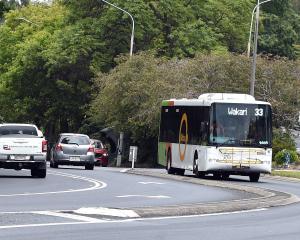
Mr Whiley, who is also a spokesman for Pro Gas Otago, made the comments after attending a public information session on oil and gas exploration, where it was revealed ''exploration drilling'' was scheduled to happen eight times between now and the end of 2018.
A timeline supplied to the Otago Daily Times showed unconfirmed drilling was scheduled to happen twice next year.
New Zealand Petroleum & Minerals national petroleum manager Kevin Rolens told the ODT the timeline was based on ''programmes of work'' supplied by oil and gas companies.
Mr Whiley, who was at last Thursday's meeting, admitted surprise at the level of activity off the coast, but hailed it as great news for the city's economy.
''I was delighted when I saw that, to be honest.''
The level of activity showed oil and gas companies were ''confident'' of finding something and indicated it was a matter of when, and not if, commercial quantities would be found.
Cr Jinty MacTavish, who was also at the meeting, said it was alarming that until last week
Dunedin people had not been told about the level of scheduled activity off the Otago coast.
''The level of information that to date has come out of Wellington around this stuff, in terms of community consultation and community engagement, has been ... abysmal.''
The threat posed by global warming meant any exploration activity was worrying, and the science on climate change showed deep-sea drilling was a ''really dumb'' thing to be doing.
There was a ''real tension'' for those who on one hand were concerned about global warming, but on the other supported exploration off the coast.
Oil Free Otago spokeswoman Danielle Trilford criticised last week's meeting as a ''PR stunt''.
''At no point were Dunedinites asked if this is the direction that we want to see our energy development to go,'' she said.
Mr Rolens said oil exploration involved a ''series of steps''.
''For example, exploration can begin with the reprocessing of existing data, followed by new data gathering through seismic surveying, and may result in the drilling of an exploration well, which supplies a lot of important physical information about a resource.''
At each of these stages permit-holders - who had exploration rights to a defined area - could decide to withdraw from exploration.
''While the work programmes of permit-holders in the Canterbury and Great South Basins have them scheduled to undertake seismic surveying or exploratory drilling in the coming years, some have yet to reach commit or surrender points - so we cannot confirm absolutely if the activity will take place.''
Mr Rolens also confirmed Searcher Seismic Pty Ltd had applied for a ''prospecting permit'' covering a large area off the Otago coast in March.
''This is classed as a non-exclusive petroleum prospecting permit application and, if granted, would allow the company to gather data and then on-sell that data to interested parties.''












